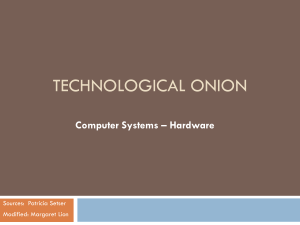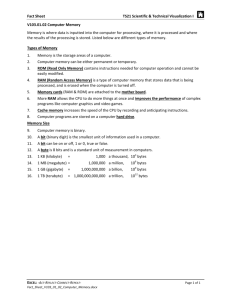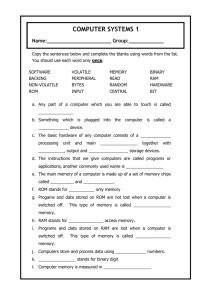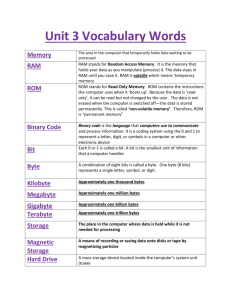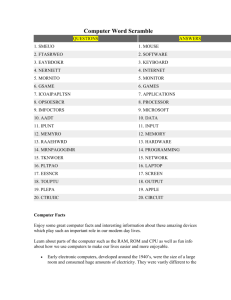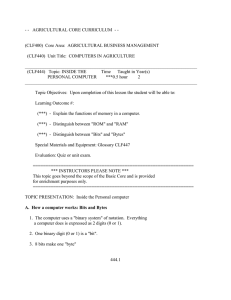Self-Test Questions
advertisement
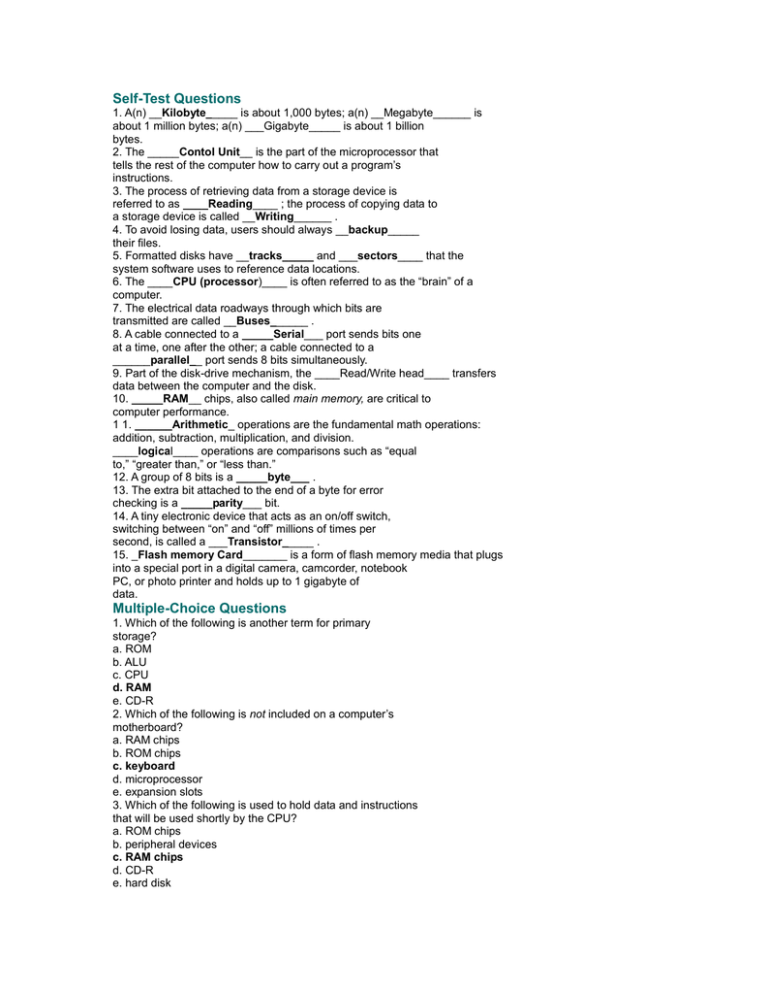
Self-Test Questions 1. A(n) __Kilobyte_____ is about 1,000 bytes; a(n) __Megabyte______ is about 1 million bytes; a(n) ___Gigabyte_____ is about 1 billion bytes. 2. The _____Contol Unit__ is the part of the microprocessor that tells the rest of the computer how to carry out a program’s instructions. 3. The process of retrieving data from a storage device is referred to as ____Reading____ ; the process of copying data to a storage device is called __Writing______ . 4. To avoid losing data, users should always __backup_____ their files. 5. Formatted disks have __tracks_____ and ___sectors____ that the system software uses to reference data locations. 6. The ____CPU (processor)____ is often referred to as the “brain” of a computer. 7. The electrical data roadways through which bits are transmitted are called __Buses______ . 8. A cable connected to a _____Serial___ port sends bits one at a time, one after the other; a cable connected to a ______parallel__ port sends 8 bits simultaneously. 9. Part of the disk-drive mechanism, the ____Read/Write head____ transfers data between the computer and the disk. 10. _____RAM__ chips, also called main memory, are critical to computer performance. 1 1. ______Arithmetic_ operations are the fundamental math operations: addition, subtraction, multiplication, and division. ____logical____ operations are comparisons such as “equal to,” “greater than,” or “less than.” 12. A group of 8 bits is a _____byte___ . 13. The extra bit attached to the end of a byte for error checking is a _____parity___ bit. 14. A tiny electronic device that acts as an on/off switch, switching between “on” and “off” millions of times per second, is called a ___Transistor_____ . 15. _Flash memory Card_______ is a form of flash memory media that plugs into a special port in a digital camera, camcorder, notebook PC, or photo printer and holds up to 1 gigabyte of data. Multiple-Choice Questions 1. Which of the following is another term for primary storage? a. ROM b. ALU c. CPU d. RAM e. CD-R 2. Which of the following is not included on a computer’s motherboard? a. RAM chips b. ROM chips c. keyboard d. microprocessor e. expansion slots 3. Which of the following is used to hold data and instructions that will be used shortly by the CPU? a. ROM chips b. peripheral devices c. RAM chips d. CD-R e. hard disk 4. Which of the following coding schemes is widely used on microcomputers? a. EBCDIC b. Unicode c. ASCII d. Microcode e. Unix 5. Which of the following is used to measure processing speed in microcomputers? a. MIPS b. flops c. picoseconds d. megahertz e. millihertz 6. Which expansion bus specializes in graphics processing? a. PCI b. ROM c. CMOS d. AGP e. AMR 7. Which element is commonly used in the making of solid-state integrated circuits? a. pentium b. Lithium C. copper d. iron e. silicon 8. DVD-Rs allow a. repeated rewriting. b. one-time recording by the user; they cannot be written on more than once. c. no writing; they are read-only. True/False Questions T 1. A bus connects a computer’s control unit and ALU. F 2. The machine cycle comprises the instruction cycle and the execution cycle. F 3. Magnetic tape is the most common secondary storage medium used with microcomputers. F 4. Main memory is nonvolatile. T 5. Pipelining is a method of speeding up processing. T 6. Today’s laptop computers can perform more calculations per second than the ENIAC, an enormous machine occupying more than 1,800 square feet and weighing more than 30 tons. T 7. USB can theoretically connect up to 127 peripheral devices. T 8. A petabyte is approximately 1 quadrillion bytes. F 9. Online secondary storage services test your computer’s RAM capacity. T. 10. Keychain memory is a pipelining device. Short-Answer Questions 1. What is ASCII, and what do the letters stand for? Binary code used with microcomputers to represent conventional characters. Digits, and special symbols American Standard Code For Information Interchange 2. Why should measures of capacity matter to computer users? 3. What’s the difference between RAM and ROM? RAM memory content may be read and written while ROM memory content may be only read. RAM are volatile while ROM are not volatile 4. What is the significance of the term megahertz? Measure of microcomputer processing speed controlled by system clock and which value is 1 million cycles per second 5. What is a motherboard? Name at least four components of a motherboard. It is the main circuit board in the system unit. It contains the following component: Microprocessor chip , RAM chips, ROM chips, Expansion cards, slots for removable component 6. What are the most convenient forms of backup storage? Magnetic Tapes; Online secondary storage (cloud storage) Why? for maintaining historical records—where there is no need for quick access. 7. Why is it important for your computer to be expandable? To increase computer capabilities by adding more RAM memory to your microcomputer or adding specific hardware to perform tasks that are beyond the scope of the basic system 8. What are three uses of a smart card? Telephone debit cards, health cards, student cards 9. What is nanotechnology? A technology that works at the level of atoms and molecules. In nanotechnology, molecules are used to create tiny machines for holding data or performing tasks 10. What are the uses of a surge protector, voltage regulator, and UPS, and why are these devices important? A surge protector, or surge suppressor, is a device that protects a computer from being damaged by surges (spikes) A voltage regulator, or line conditioner, is a device that protects a computer from being damaged by insufficient power—“brownouts” or “sags” in voltage A UPS (uninterruptible power supply) is a battery-operated device that provides a computer with electricity if there is a power failure Why: These devices help to protect your microcomputer 11. Explain the binary system. A two-state system used for data representation in computers. It has only two digits:0, 1. 12. What is Unicode? Binary coding scheme that uses 2 bytes for each character rather than 1 byte, It can handle 65,536 character combinations. 13. Why is silicon used in the manufacture of microprocessors? it is only a semiconductor, silicon has partial resistance to electricity. As a result, highly conducting materials can be overlaid on the silicon to create the electronic circuitry of the integrated circuit 14. What is Blu-ray used for? record, rewrite, and play back high-definition (HD) video, as well as to store large amounts of data. Self-Test Questions 1. A(n) _Dumb_______ terminal is entirely dependent for all its processing activities on the computer system to which it is connected. 2. The two main categories of printer are ____impact____ and _NonImpact_______ . 3. ___Ergonomics_____ is the study of the physical relationships between people and their work environment. 4. A(n) ___mouse_____ is an input device that is rolled about on a desktop and directs a pointer on the computer’s display screen. 5. _____ouput devices___ consists of devices that translate information processed by the computer into a form that humans can understand. 6. _____Biometrics___ is the science of measuring individual body characteristics. 7. CRT is short for _Cathod Ray Tube_______ . 8. LCD is short for ___Light Cristal Display____. 9. An ___Page description Language_____ is software that describes the shape and position of characters and graphics to the printer. 10. When people in different geographic locations can have a meeting using computers and communications, it is called ___VideoConference____ . 11. ____Active____ -matrix screens are much brighter and sharper than _____Passive___ -matrix screens, but they are more complicated and thus more expensive. 12. A debilitating condition caused by pressure on the median nerve in the wrist, producing damage and pain to nerves and tendons in the hands, is called ___Carpal Tunnel Syndrom_____ . 13. The measure of the number of dots that are printed in a linear inch is called _Resolution_______ or ________ . 14. A printer that forms characters or images by striking a mechanism such as a print hammer or wheel against an inked ribbon, leaving images on a paper, is called a(n) _____impact___ printer. 15. ______laser_ printers enabled the development of desktop publishing Multiple-Choice Questions 1. Which of the following is not a pointing device? a. mouse b. touchpad c. keyboard d. joystick 2. Which of the following is not a source data-entry device? a. bar-code reader b. sensor c. digital camera d. scanner e. mouse 3. Which of the following display standards has the highest screen resolution? a. XGA b. UXGA c. VGA d. SVGA e. QXGA 4. Which of the following isn’t considered hardcopy output? a. spreadsheet printout b. microfilm c. fax report d. Word document computer file e. printed invoice 5. Which of the following factors does not affect the quality of a screen display? a. refresh rate b. speed c. resolution d. pixels e. color depth True/False Questions T 1. On a computer screen, the more pixels that appear per square inch, the higher the resolution. T 2. Photos taken with a digital camera can be downloaded to a computer’s hard disk. F 3. Resolution is the amount of space between the centers of adjacent pixels. F 4. The abbreviation dpi stands for “dense pixel intervals.” T 5. Pointing devices control the position of the cursor on the screen. T 6. Output hardware consists of devices that translate information processed by the computer into a form that humans can understand. T 7. Optical character-recognition software reads “bubble” marks and converts them into computerusable form. F 8. The lower the refresh rate, the more solid the image looks on the screen. T 9. CRTs consume more power than flat-panel displays do. T 10. Computer users have no need to be concerned about ergonomics. F 11. It has been proven that electromagnetic fields pose no danger to human beings. T 12. Plotters are used to print architectural drawings and in computer-aided design Short-Answer Questions 1. What is a common use of dumb terminals? It can input and output data but not process data 2. What characteristics determine the clarity of a computer screen? Resolution, color depth, dot pitch, refresh rate 3. Describe two situations in which scanning is useful. Digitizing and preserving old books and manuscripts 4. What is source data entry? Data entry devices that create machine-readable data on magnetic -media, or paper or feed it directly into the computer’ processor without the use of keyboard 5. What is pixel short for? Short of picture element What is a pixel? Smallest unit on the screen that can be turned on/off or made different shades. 6. Briefly describe RSI and CTS. Why are they problems? 7. What is a font? typeface and type size of symbols or characters to display 8. Discuss the different types of printers and their Features. Impact. Non impact printers Laser, dot-matrix printers 9. Explain the differences between CRT monitors and LCD Monitors. Compared to CRTs, flat-panel LCD displays are much thinner, weigh less, and consume less power, which is why they are used in portable computers. CRTs are still cheaper, but flat-panel prices have come down, and they have been matched by technical advances that make flat panels a better choice. What is OCR used for? Software that converts scanned text from images (pictures of the text) to an editable text format (usually ASCII) that can be imported into a word processing application and manipulated
